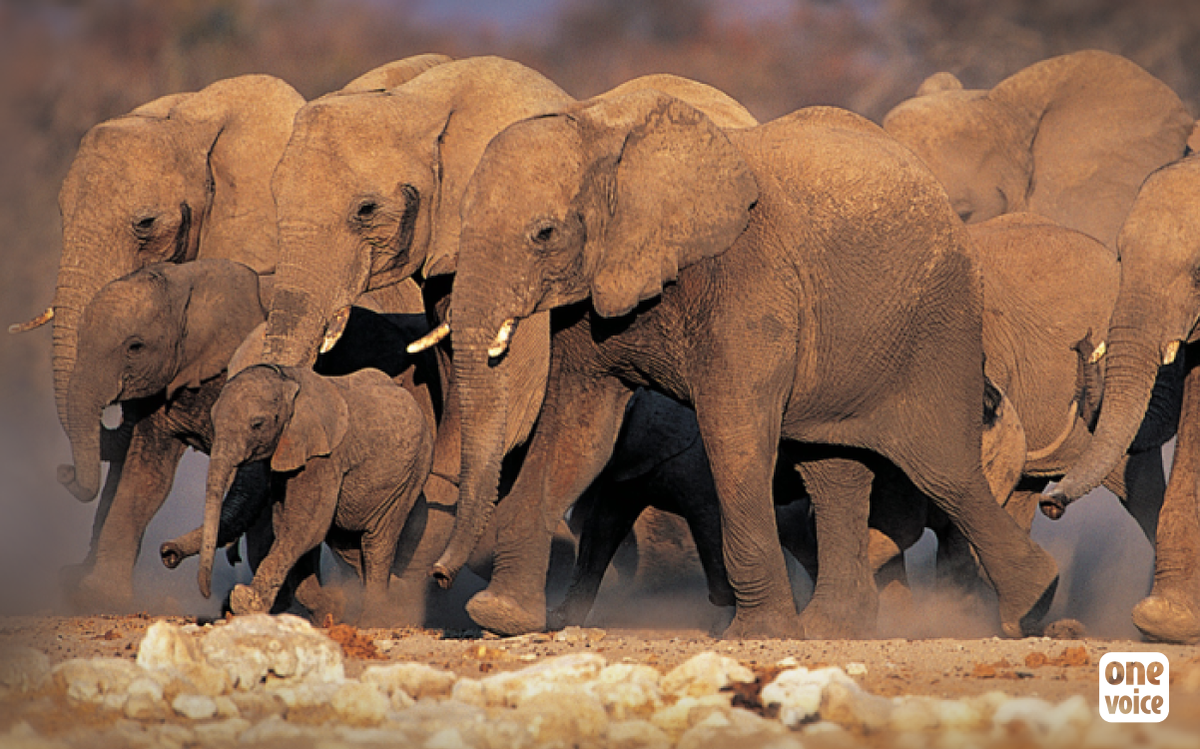

When Zimbabwe sells off its wild fauna
Zimbabwe has put its reserve animals up for sale to avoid them dying of hunger and thirst. One Voice denounces the systematic haemorrhage of these sensitive beings, under threat from profiteering by zoos and hunting reserves, and above all from a not very democratic regime.
Whilst the country is being hit by severe drought threatening more than a quarter of its population from starvation, we have learned that the Zimbabwe Parks and Wildlife Management Authority, (ZIMPARKS) is inviting potential buyers to declare their interest: lions, elephants, rhinoceros… They will go to zoos and also private hunting reserves. Zimparks manage a surface area of 47,000 km
2, spread over ten national parks, the equivalent of 12.5% of the country’s territory. No precise information has been given on the species to be sold and their price, but rumours say that a baby elephant could be worth up to 60,000 dollars.
This isn’t the first time. In 2012, four terrified baby elephants were torn away from their herd in Zimbabwe and transported to zoos in the centre and the North West of China. They survived the voyage but one of them died shortly after its arrival. The three surviving elephants are in very bad health.
In 2014, Zimbabwe offended again: 24 new elephants were taken from their families. Sent to China, today they are learning to dance whilst their trainer brandishes his rod to a background of deafening music. In China, like in Amneville, zoos are also circuses. Rare images show the elephants looking thin, covered in dust with bleeding wounds, worked up. Their homeland, the savannah, is far away… Their sale in 2014 was not justified by a drought, but by the need to pay the salaries of the eco-wardens and to diminish the population of invasive pachyderms who were threatening crop production.
We see these pretexts over time. Zimbabwe is however the only country in the region to evoke such economic problems as a reason. And also the first to welcome wealthy trophy hunters with open arms, such as the American dentist Walter Palmer who decapitated the lion, Cecil, last summer. These massacres generate fabulous cash injections, but they certainly don’t go into the right pockets. Robert Mugabe has managed his country with disastrous consequences, making many African individuals rich off the back of a population hard hit by poverty. This hero of the war of independence has put the culture of his country into the hands of corrupt courtesans, incapable of looking after it, and driving it to ruin. Today’s Zimbabwe is crushed under the weight of a senile dictatorship: one that is homophobic, racist, sexist and freedom eradicating. Mugabe proudly declared in 2003: ”
Hitler had only one objective: justice for his people, sovereignty for his people, recognition of the independence of his people and their rights over their resources. If that is Hitler, then let me be Hitler tenfold”
Today other countries like Kenya, Tanzania, and Rwanda are trying to make eco-tourism profitable. These thousands of hectares of virgin forest, populated with rare and threatened species, are green gold in their hands. Zimbabwe is home to several species of wild animals, within this the famous “Big Five”: the lion, the leopard, the elephant, the rhinoceros and the buffalo. More than 80,000 elephants and 750 black rhinoceros live there.
Robert Mugabe’s behaviour is worrying. Essentially, he could inspire other tyrants who haven’t hesitated already to deliver the Virunga mountains to oil prospectors. Never has the traffic of endangered species thrived so well, supplying the zoos, circuses and private collections of Dubai billionaires.
One Voice thinks that France should intervene, as have other nations who support the African development effort. It should demand the strictest preservation of the local fauna as a condition in any cooperation agreements from its African partners. As for Zimbabwe, it deserves international diplomatic condemnation.